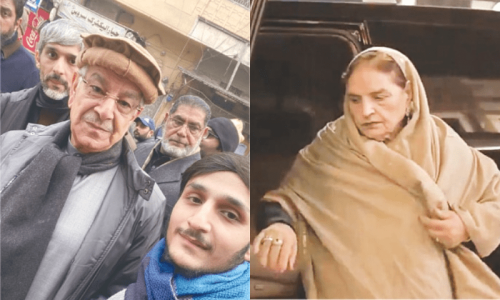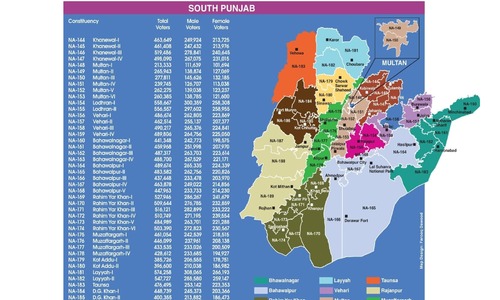• Marriyum says party not oblivious to defeats in strongholds
• Insiders blame Sharifs’ outdated 90s playbook, absence of youth engagement
Even as the party’s top-tier leadership continues hectic efforts to form a government in the Centre, Punjab and Balochistan, there is a sense of shock among PML-N ranks over losses in Punjab — especially areas the party considered its strongholds.
Defeats for key leaders such as Rana Sanaullah in Faisalabad, Khwaja Saad Rafique in Lahore and Mian Javed Latif in Sheikhupura, among others, have prompted calls for introspection before moving forward, both from the defeated candidates and others within party echelons who have woken up to the reality that their popularity has taken a hit.
“The Sharifs and the other senior leaders were shaken by the results in Punjab, but they are trying to put on a brave face as they focus on forming a coalition in Islamabad,” one party leader told Dawn on Sunday.
PML-N Information Secretary Marriyum Aurangzeb has already indicated that the party was open to ‘soul searching’. Speaking to a private TV channel on Saturday, she said the party is thinking about why it has lost from its traditional strongholds, adding that the party was not “insensitive or oblivious” to this reality.
“Although we are the largest party in Punjab, the PML-N will figure out the causes of its defeat in different areas of Punjab.”
In conversations with Dawn, a couple of PML-N leaders said on Sunday that it was the leadership’s “miscalculation”, i.e. their failure to properly assess public sentiment, especially that of the youth, which cost the party dearly.
“The popularity of the PML-N started dipping soon after sending the Imran Khan government home through a no-confidence motion in April 2022. The first mistake was to cobble together a coalition government, which proved disastrous in terms of making the lives of the masses miserable through inflation. Now, almost everyone is realising that the party made a mistake by not going for elections immediately after toppling Mr Khan’s government,” a PML-N leader from Punjab said.
Another aspect of the party’s politics that apparently did not sit well with voters was the appearance of being pro-establishment.
“You see… we did not have any narrative at the time of going into election. We tried our best to replace the ‘development narrative’ with that of ‘vote ko izzat do’ (give respect to the vote), but it didn’t work. That is a cost a party has to bear when it does politics under the umbrella of the powers that be,” he said.
Thirdly, he argued, the party had no answer to the PTI’s perpetual and strong campaign against the Sharifs on social media, painting them as corrupt.
Another leader considered close to the Maryam Nawaz camp told Dawn the results in Punjab were more than a wake-up call for the Sharifs, who needed to revisit their 1990s-style politics, which had become completely outdated in 2024.
Although there had been talk of complacency within the party ranks, but those who lost their constituencies did not consider this a factor, as they used all available resources in their election campaign.
“The PML-N’s vindictive politics also benefited PTI-backed candidates. Had the leadership played smart on this front and adopted a reconciliatory approach towards the Khan’s party, the PTI might not have gotten such a large sympathy vote.”
PML-N stalwart Khurrum Dastgir, who was among those who lost his seat in the party’s traditional stronghold of Gujranwala, also referred to the party’s failure to effectively engage the youth.
Ahmed Bilal Mehboob, president of the Pakistan Institute of Legislative Development and Transparency (Pildat), was of the view that the PML-N had the lowest number of young candidates in the Feb 8 polls — just 4 per cent — while the PPP had 9 per cent.
“The youth was not the focus of the PML-N’s politics; the Sharifs are known for family-based politics, even former premier Shahid Khaqan Abbasi has termed the party a ‘family-based organisation’,” he said.
Talking to Dawn, Mr Mehboob also pointed to other factors that could be behind the poor performance of the PML-N in Punjab.
“The party’s campaign was lacklustre. It also lagged far behind in virtual campaigning — in terms use of artificial intelligence (AI) and social media platforms,” he said and added the PML-N leadership also failed to effectively craft a narrative during their election campaign.
The impression of being the ‘B-Team of the establishment’, he said also dwindled its mass appeal.
Mr Mehboob, however, says the PML-N’s popularity may suffer more if it decides to form a coalition government in the Centre with such a shaky mandate, because the challenges before them are monumental.
“But it seems the PML-N thinks enough damage has already been done by siding with the establishment — [they are probably thinking] let’s have the government and defer this popularity thing for some other time,” he concluded.
Published in Dawn, February 12th, 2024












































Dear visitor, the comments section is undergoing an overhaul and will return soon.